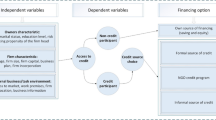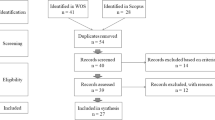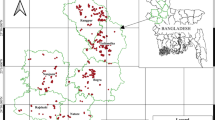Abstract
Women play an important role within small-scale fishing communities in sub-Saharan Africa through engaging in fish value chain activities and contributing to household food security and income. There is, however, little empirical information about the nature of women’s engagement in small-scale fishery value chains and the outcomes of that engagement especially in Malawi, our study country. This study addresses the gap by examining (1) the ways in which women participate in fish value chains; (2) the outcomes of their participation at individual, household, and community level; and (3) how social relations influence the participation and the outcomes obtained. The study adopted a case study approach and draws upon qualitative data from the two small-scale fisheries in Msaka on Lake Malawi and Kachulu on Lake Chilwa. The research applies a social relations approach in the line of Kabeer, in examining women’s participation and outcomes of participation within the small-scale fisheries. Our study reveals that women provide significant social and economic benefits to their families and the broader community as they participate as processors and traders with a few participating at the production node as gear owners. The study also finds that women encounter challenges that may have potential to negatively affect their engagement in the small-scale value chains including gender-based discrimination as some women are restricted by their husbands to engage in the intermediary role especially at Kachulu; the few women who join the crew fishing face social exclusions, poor working conditions, care burden that limits women’s time to actively participate in value chain activities. The study highlights the social norms associated with hierarchical husband-wife relationships have negative effects on women’s participation and the outcomes derived in the value chain activities. This research adds to the body of work that examines issues of social relations and their impacts on the well-being and roles of women in small-scale fisheries.




Similar content being viewed by others
Data availability
The data underpinning the findings of this research are not yet publicly available in any consolidated form.
Notes
The Department of Fisheries in Malawi defines a “fisherman” as the “gear owner.” In this study, we refer to gear owners and crewmembers as “fishers”
Zitenje refers to cloth wrapper used by women
They term this practice as “chisabwana” meaning “without the boss” (female gear owner, Kachulu).
References
Albert, Joelle A., Doug Beare, Anne-Maree Schwarz, Simon Albert, Regon Warren, James Teri, Faye Siota, and Neil L. Andrew. 2014. The contribution of nearshore fish aggregating devices (FADs) to food security and Livelihoods in Solomon Islands. PLoS One 9 (12): e115386 Public Library of Science.
Allison, E.H., and F. Ellis. 2001. The livelihoods approach and management of small-scale fisheries. Marine Policy 25: 377–388.
Allison, E.H., A.L. Perry, M.-C. Badjeck, W. Neil Adger, K. Brown, D. Conway, and N.K. Dulvy. 2009. Vulnerability of national economies to the impacts of change on fisheries. Fish and Fisheries 10: 173–196.
Batliwala, S. 2007. Putting power back into empowerment (online) available https://www.opendemocracy/article/puttin_power_back_into_empowerment. Accessed 23 Nov 2018
Beddington, J.R., D.J. Agnew, and C.W. Clark. 2007. Current problems in the management of marine fisheries. Science 316: 1713–1716.
Berg, B.L. (2004) Qualitative Research Methods for Social Sciences, 5th Edition, Pearson Education, Boston.
Chiwaula, L. Jamu, D. Chaweza, R. and Nagoli, J. 2012 The structure and margins of the Lake Chilwa fisheries in Malawi: a value chain analysis. World Fish Centre Project Report 2012-12
Chuenpagdee, R., M. Lisaliguori, L.D. Palomares, and D. Pauly. 2006. Bottom –up global estimates of small-scale marine fisheries catches. Fisheries Centre Research Reports 14. https://doi.org/10.14288/1.074761.
Cole, S.M., R. Puskur, S. Rajaratnam, and F. Zulu. 2015. Exploring the intricate relationships between poverty, gender inquality and rural masculinity: a case study from aquatic agricultural system in Zambia. Culture, Society and Masculinity 7: 154.
Coles, C. and Mitchell, J. 2010 Gender and agricultural value chains – a review of current knowledge and practice and their policy implications Overseas Development Institute London UK http://www.fao.org/3/a-am310e.pdf. Accessed 28 Nov 2018
Coulthard, S. 2012. Can we be both resilient and well and what choices do people have? Incorporating agency into the resilience debate from a fisheries perspective. Ecology and Society 17. https://doi.org/10.5751/ES-04483-170104.
Department of Fisheries, 2017. 2017 Annual Frame Survey Report of the Small Scale Fisheries. Fisheries Research Division
FAO, 2005. Country profile http://www.fao.org/fi/oldsite/FCP/en/mwi/profile.htm Accessed 23 Oct 2018
FAO, 2013. Implementing improved tenure governance in fisheries. A technical guide to support the implementation of the voluntary guidelines on the responsible governance of tenure of land, fisheries and forests in the context of natural food security preliminary version, September 2013. Rome 71pp Food and Agriculture Organisation of the UN Regional Office for Asia and the Pacific Bangkok 2011 RAP Publication 2011/15 ISBN978 – 92 – 5 106934-9
FAO, 2015. Voluntary guidelines for securing sustainable small scale fisheries in the context of food security and poverty eradication. FAO Rome ISBN 978-92-5-108704-6
Fernandez-Pascal, J.J., Frangoudes, K and Williams, S. 2005. Local institutions in (Eds) Kooiman J, Bavinck, M., Jentof, S. and Pillin, R. (2005) fish for Life Intesadine Governance for Fisheries. Amsterdam University Press.
Frangoudes, K., and S. Gerrard. 2018. EnGendering change in small scale fisheries and fishing communities in a globalized world. Maritime Studies 17 (117): 124. https://doi.org/10.1007/s40152-018-0113-9.
Hara, M. and Njaya, F. 2014. Spatial and Institutional Boundaries: Access and Appropriation of Natural Resources in Lake Chilwa Floodplain. In Ramutsindela, M. (ed) Cartographies of Nature: How Nature Conservation Animates Borders, pp. 55–81. New Castle upon Tyne: Cambridge Scholars Publishing.
Harper, S., D. Zeller, M. Hauzer, D. Pauly, and R.U. Sumaila. 2013. Women and fisheries: contribution to food security and local economies. Marine Policy 39: 56–63. Elsevier. https://doi.org/10.1016/j.marpol.2012.10.018.
Kabeer, N. 1989. Resources, agency achievements: reflections on the measurement of women’s empowerment. Development and Change 30 (3): 435–464.
Kabeer, N. 1994. Reversed realities: Gender hierarchies in development thought London. UK: Verso.
Kleiber, D., L.M. Harris, and A.C.J. Vincent. 2015. Gender and small-scale fisheries: a case for counting women and beyond. Fish and Fisheries 16 (4): 547–562.
Lentisco, A. and Lee Ulric, R. 2015. A review of womens access to fishing small scale fisheries FAO Fisheries and Aquaculture Circular No 1098. http://www.fao.org/3/a-i4884e.pdf. Accessed 17 Nov 2018.
Locke, C., and C. Okali. 1999. Changing gender relations: methodological challenges for gender planning. Development in Practice 9 (3): 274–286.
Mtunda, M., Namwaza. A., Nnensa, A. and Nyando, E. 1998. Women in Fishing Communities: Activities, problems, Income Sources, Average monthly Incomes and Socio-cultural parameters. Department of Fisheries, Malawi
National Statistics Office. 2008. Population and housing census report. Zomba Malawi: NSO.
Ostrom, E. (2000). Collective Action and the Evolution of Social Norms. Journal of Economic Perspectives 14(3):137–158. https://www.jstor.org/stable/2646923
Palinkas, L.A., S. Horwitz, C. Green, J.P. Wisdom, N. Duan, and K. Hoagwood. 2015. Purposeful sampling for qualitative data collection and analysis in mixed method implementation research. Administration and Policy in Mental Health 42 (5): 533–544. https://doi.org/10.1007/s10488-013-0528-y.
Pawar, M. 2006. “Social” “capital”? The Social Science Journal 43 (2): 211–226.
Razavi, S. and Miller, C. 1995. From WID to GAD: conceptual shifts in the women and development discourse UNRISD Occasional Paper 1 Geneva UNRISD.
Ribeiro, M.M., and W. Zwirner. 2010. Applying participatory processes: findings from a supply chain analysis on the commercialisation of paper mulberry bark in Laos. Systemic Practice and Action Research 23 (4): 323–340.
Sari, I. McDougall, C. and Rajaratnam, S. 2017. Women’s empowerment in aquaculture. Two case studies from Indonesia. Engagement, outcomes and constraining and enabling factors for women in shrimp farming and fish processing FAO and International Centre for Living Aquatic Resources Management (ICLARM) ISBN 978925-1-09859-2
Schmitz, H. 1999. Collective efficiency and increasing returns. Cambridge Journal of Economics 23 (4): 465–483. https://doi.org/10.1093/cje/23.4.465.
Williams, M.J. 2008. Why look at fisheries through a gender lens? Development 2008 (51): 180–185. https://doi.org/10.1057/dev.2008.2.
Worldfish. 2013. Improving food security and reducing poverty through intra-regional fish trade in sub-Saharan Africa CRIS No.DCI-FOOD2012/309-438 EU Fish Trade_e3b_applicform_en 1 28Aug2013.
Yin, R. 1994. Case study research: design and methods. 2nd ed. Beverly Hills: Sage Publishing.
Acknowledgments
Special thanks go to Cynthia McDougall and Fiona Simmance for their critical review of the drafts for the paper. The authors also extend thanks to all respondents for participating in this study, as well as all Department of Fisheries staff for field work logistical assistance.
Funding
This work was undertaken as part of the CGIAR Research Program on Fish Agrifood Systems (FISH). Funding for this study was provided by European Union–funded Fish Trade Progamme implemented through the Lusaka Zambia office. The research was also in part funded by the Gender Equality Studies Training (GEST) programme of the University of Iceland.
Author information
Authors and Affiliations
Contributions
The first author conducted the field research and data analysis and wrote the initial manuscript. The two co-authors contributed to the manuscript by providing analytical and theoretical input.
Corresponding author
Ethics declarations
The research was approved as part of the lead authors PhD studies by the Humanities and Social Science Research Ethics Committee of the University of the Western Cape, with ethics reference number HS/16/1/5. Verbal consent was obtained from participants before commencement of interviews. Ethical clearance was sought through the University of the Western Cape in South Africa through the faulty of Economics and Management Sciences.
Competing interests
The authors declare that they have no competing interests.
Disclaimer
The views and opinions expressed herein are those of the authors and by no means those of the European Union, WorldFish, nor GEST programme.
Additional information
Publisher’s note
Springer Nature remains neutral with regard to jurisdictional claims in published maps and institutional affiliations.
Rights and permissions
About this article
Cite this article
Manyungwa, C.L., Hara, M.M. & Chimatiro, S.K. Women’s engagement in and outcomes from small-scale fisheries value chains in Malawi: effects of social relations. Maritime Studies 18, 275–285 (2019). https://doi.org/10.1007/s40152-019-00156-z
Received:
Accepted:
Published:
Issue Date:
DOI: https://doi.org/10.1007/s40152-019-00156-z




